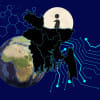Internet blackout: How our youngest generations are dealing with this situation

There's an entire generation of young people today who have grown up with almost constant access to the internet. Whether it's for academics, entertainment, or simply staying connected with their peers, these young individuals, along with the rest of the world have become heavily reliant on the World Wide Web.
However, as of writing this article, four days have passed since Bangladesh's countrywide internet blackout. According to reports, on July 18, a fire at a data centre located in Mohakhali, Dhaka crippled the country's entire internet infrastructure.
Millions of people have been disconnected from each other and subsequently, the world outside. Although not many might realise it, those from our youngest generation were of the ones hit the hardest by this internet blackout.
Instead of watching shows on television or movies on DVD players, kids from this generation grew up watching YouTube and streaming platforms like Netflix. Instead of owning CDs, or downloading and filling up memory cards with songs in MP3 format, they would stream music from all over the world through YouTube and Spotify.
The internet has also been important for this generation's academic needs. Many of them have teachers giving them homework online. Students have also been using the internet to attend online classes and to learn difficult concepts.
This is also a generation that grew up witnessing the rise of remote work – a concept that was rather foreign to many till the Covid-19 pandemic. They have seen their parents, siblings, and relatives work and earn from the comfort of their respective homes whether through local remote jobs or freelancing.
Hence, when the internet was taken away from them last week, it was natural for them to feel puzzled. Most of them didn't own DVD players nor did they have music CDs or downloaded songs or movies. Many of them, for the first time, would go on to realise how many channels their TVs had.
Of course, it's not always fun and games or academics for this young generation. The internet serves other purposes as well, some of which are more important than everything else combined. This was evident during the recent quota reform protest that had began just weeks before the internet blackout.
While students from universities and colleges had taken to the streets in protest, those from the younger generation – almost all of whom are school-going kids – took to the internet to show their support for the protests and announce their solidarity.
This show of support and solidarity came in many forms, whether it be through sharing news stories or posts related to the protest, or being actively vocal about the necessity of the quota reform on different forums or social media threads.
The internet blackout took place during the peak of the Quota Reform Movement, and as outdoor movement was restricted – due to the unrest that unfolded and then the curfew imposed by the government – our youngest generations found themselves confused not knowing what to do or how to spend their time at home.
Even then, they did not hesitate to work out a life for themselves outside the confines of their smartphones and the internet. With schools shut, many turned to books to keep themselves busy. The cable TV became a major source of entertainment as well as keeping up with what's happening in the country. Some have even turned to board games as a form of leisure.
For many families, the internet blackout served as a way to connect better with their kids from this particular generation. Family and sibling time became more about humane interactions with each other and less about what they had seen on the internet. As for staying connected with each other, these kids exchanged text messages the old fashion way through their phone's SMS feature, not through Messenger or WhatsApp.
Now, as for showing solidarity with important causes like the quota reform protests, we have seen how vocal our youngest generation can be online. However, as was evident from the protests on the ground, many school-going kids had also participated in these protests. Hence, take the internet away from them, and these young minds will have no trouble taking their voice and activism out on the streets. Thus, simply calling them "keyboard warriors" is an insult to just how impactful this generation can be when needed.
By the time this article reaches you, the internet situation might or might not return to normal. However, if you are someone from the generation in question, don't worry; you'll be fine regardless.
Faisal is the in-charge of Campus, Rising Stars, and Star Youth.

 For all latest news, follow The Daily Star's Google News channel.
For all latest news, follow The Daily Star's Google News channel. 








Comments